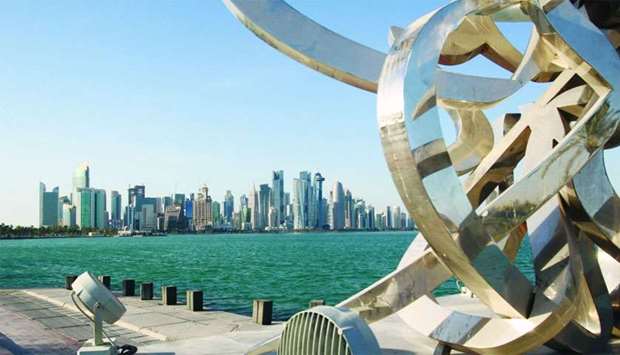Qatar’s international reserves may exceed $41bn in 2023, from the current $35.6bn, FocusEconomics estimated and noted it will cover 11.3 months of country’s imports.
In its latest economic update on the country, the researcher said Qatar’s public debt will fall gradually until 2023, and estimated to be 51.3% this year, 49.1% (in 2020), 45.6% (in 2021), 42.7% (in 2022) and 39.9% (in 2023).
Qatar’s fiscal balance as a percentage of GDP is set to rise to 4.5% in 2023 from an estimated 0.6% this year, FocusEconomics said.
The current account balance (as a percentage of the country’s GDP) will be 7.4% in 2023 compared with 6.7% in 2019.
Qatar’s merchandise trade balance, FocusEconomics said, will be $57bn in 2023. This year, it will account for $47.2bn.
Qatar’s gross domestic product is expected to reach $242bn by 2023, it said. By the year-end, Qatar’s GDP may total $198bn.
Qatar’s economic growth in terms of nominal GDP will reach 5.1% in 2023 from 3.2% by the year-end.
The country’s inflation, the report noted, will be 2.1% in 2023 and 0.6% this year.
Qatar’s unemployment rate (as a percentage of active population) will remain a meagre 0.2% in 2023, unchanged from this year.
According to FocusEconomics, Qatar’s growth would likely have accelerated in the first quarter of this year after a “frail” final quarter (Q4) 2018.
The real estate price index continued to edge higher in March, suggesting “stabilisation” in the housing sector, while the non-oil private sector PMI and private sector credit growth averaged higher than in the quarter prior, boding well for domestic demand.
Turning to Q2, the non-oil sector appeared to lose momentum in the quarter as reflected by its PMI declining in April and May, although should have remained solid overall.
In April, Qatar’s industrial production picked up, tourist arrivals surged year-on-year and private credit growth accelerated, FocusEconomics said.
Last month, state-owned Qatar Petroleum signed a deal with Chevron to build a multi-billion dollar petrochemical project, “boding well” for investment and the energy sector going forward.
Qatar’s growth should “gain impetus” this year, propped up by a recovery in the energy sector, and infrastructure projects related to the 2022 World Cup.
FocusEconomics panellists see growth of 2.6% in 2019, which is unchanged from last month’s estimate, and 2.8% in 2020.
Consumer prices fell 0.7% in annual terms in May (April -0.4% y-o-y).
FocusEconomics see inflation returning later this year on “stronger” economic activity, but should be subdued nonetheless.
Their panellists expect inflation to average 0.6% in 2019, which is down 0.3 percentage points from last month’s forecast, and 2.3% in 2020.
Qatar’s fiscal balance as a percentage of GDP is set to rise to 4.5% in 2023 from an estimated 0.6% this year, FocusEconomics said.
The current account balance (as a percentage of the country’s GDP) will be 7.4% in 2023 compared with 6.7% in 2019.
Qatar’s merchandise trade balance, FocusEconomics said, will be $57bn in 2023. This year, it will account for $47.2bn.
Qatar’s gross domestic product is expected to reach $242bn by 2023, it said. By the year-end, Qatar’s GDP may total $198bn.
Qatar’s economic growth in terms of nominal GDP will reach 5.1% in 2023 from 3.2% by the year-end.
The country’s inflation, the report noted, will be 2.1% in 2023 and 0.6% this year.
Qatar’s unemployment rate (as a percentage of active population) will remain a meagre 0.2% in 2023, unchanged from this year.
According to FocusEconomics, Qatar’s growth would likely have accelerated in the first quarter of this year after a “frail” final quarter (Q4) 2018.
The real estate price index continued to edge higher in March, suggesting “stabilisation” in the housing sector, while the non-oil private sector PMI and private sector credit growth averaged higher than in the quarter prior, boding well for domestic demand.
Turning to Q2, the non-oil sector appeared to lose momentum in the quarter as reflected by its PMI declining in April and May, although should have remained solid overall.
In April, Qatar’s industrial production picked up, tourist arrivals surged year-on-year and private credit growth accelerated, FocusEconomics said.
Last month, state-owned Qatar Petroleum signed a deal with Chevron to build a multi-billion dollar petrochemical project, “boding well” for investment and the energy sector going forward.
Qatar’s growth should “gain impetus” this year, propped up by a recovery in the energy sector, and infrastructure projects related to the 2022 World Cup.
FocusEconomics panellists see growth of 2.6% in 2019, which is unchanged from last month’s estimate, and 2.8% in 2020.
Consumer prices fell 0.7% in annual terms in May (April -0.4% y-o-y).
FocusEconomics see inflation returning later this year on “stronger” economic activity, but should be subdued nonetheless.
Their panellists expect inflation to average 0.6% in 2019, which is down 0.3 percentage points from last month’s forecast, and 2.3% in 2020.




